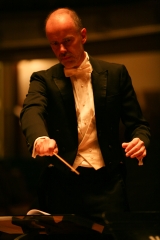Culture Vulture: Dead Elvis Lives
The Chamber Orchestra of Boston’s final concert of the season reaffirmed the city’s high level of musicianship.

Chamber Orchestra of Boston conductor David Feltner
Although it is a popular and engaging staple of the concert hall, the fully staged version of Igor Stravinsky’s L’Histoire du soldat or The Soldier’s Tale is one of the least performed in the classical repertoire. Written while the composer took refuge in Switzerland during the First World War—after Firebird, Petrushka, and The Rite of Spring—and when money and musical resources were in short supply, Stravinsky was thinking small and scored it for one violin, one bass, one clarinet, one bassoon, one trumpet, one trombone, and one percussionist (a scoring that makes it a perennial favorite of conservatory students).
Nonetheless, he specified that it be “read, played, and danced,” thus requiring at the very least one actor and one dancer. Inspired by Russian folktales, written by a Swiss novelist, and translated by a British librettist, the story is a mishmash of a Faustian bargain spliced with fairy tale: the Devil gets the soldier’s fiddle with the offer of a magic book that will bring him all the wealth in the world; the soldier cures a sick Princess; the Devil gets him in the end. Also there’s the soldier’s old mother.
The Chamber Orchestra of Boston (COB) asked Paula Plum to collapse the roles of narrator, actor, and dancer into one—a challenge for the most versatile performer and one that showcased the problematic nature of the work as a theater piece.
The music, rhythmically intricate, referencing and taking off on hallowed musical forms such as a Bach chorale and American ragtime, was performed expertly by the members of the COB. Unfortunately, the ingenuity of the music is not matched by the text. It has no doubt dated badly and needs editing for a contemporary audience and a consistent English-language style.
Ms. Plum chose a heroic, overblown style of narration that made her storytelling as well as portrayal of the soldier, the Devil, and the Princess confusing for the audience. Sometimes she sounded like a librarian reading a Dr. Seuss book to small children; other times she sounded like a hapless actor trapped by a script that required her to enunciate over the music such incongruous bits of dialogue as “Good-bye old chap!” “Howdy!” “Adios,” and “Later.”
Whatever Stravinsky was thinking when he got together with Swiss novelist C. F. Ramuz got lost in translation. This is a piece waiting for some innovative stage director to take a good look, clean-up it up, and bring it into the 21st century.
The second piece in the program (scored for exactly the same ensemble minus the narrator) was Michael Daugherty’s Dead Elvis, a short piece written in 1993. In the place of the narrator stands the bassoonist, dressed as Elvis, complete with shades and toupee, his large phallic instrument making pelvic contortions unnecessary to make his point.
Although the program note by the composer cites the Faustian bargain Elvis made by selling out to Las Vegas and the question of the rock star’s death as embodied by the work, I found the piece fun, the bassoon an eccentric musical choice for Elvis, and the performance leaving me once again amazed at the high quality of musicianship in Boston.
====================================================
The new edition of Helen Epstein’s Music Talks is available online and at music outlets like the shop at Symphony Hall in Boston. She is also the author of Joe Papp. Order these books through the link below to Amazon and The Arts Fuse receives a (small) percentage of the sale.
Tagged: Chamber Orchestra of Boston, Culture Vulture, Elvis Lives, Paula Plum


Your review made me think about how sad it is that Elvis is so often used as shorthand for decadence and artistic lethargy. For one thing, his Vegas period was only a sliver of his musical life. What a shame that artists don’t find more inspiration in the pre-Vegas Elvis than in his period of decline. For another, Elvis was actually at the peak of his vocal and performing powers during the first few years he appeared in Las Vegas. The conflation of those performances with the embarrassing ones of his later years is another unfortunate oversimplification.
When the other great popular singers of the 20th century are referenced — Frank Sinatra, Billie Holiday, Ray Charles, Ella Fitzgerald, and so on — it’s generally for their brilliance rather than their decline. Elvis deserves no less.